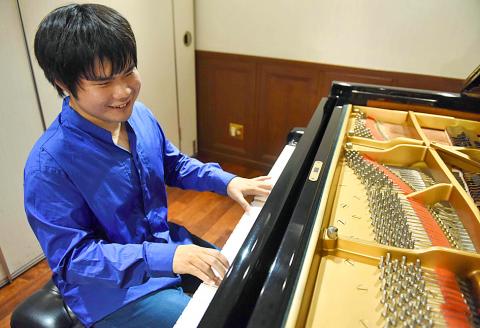Blind since birth, virtuoso Japanese pianist Nobuyuki Tsujii puts his global success down to a wide range of experiences outside music — and listening to how the conductor breathes.
“I love sport, I love swimming, skiing,” the 29-year-old said in an interview. “The more I experience, the more positive things it brings me as a musician.”
Tsujii — or “Nobu” as he is known — has risen to become a star of the international classical music scene, playing in more than 160 concerts around the world in locations such as London’s Royal Albert Hall and Carnegie Hall in New York and becoming a joint winner of the Van Cliburn gold medal.

Photo: AFP
He has played with the London Philharmonic and will be giving his first major recital in France later this month, while an elegy he wrote for the victims of the 2011 earthquake and tsunami in Japan has gotten 13 million views on YouTube.
Born in Tokyo, Tsujii’s love of music started at the age of eight months, when his mother played him a CD by Polish composer Frederic Chopin.
“I wiggled my legs in time to the music,” he said.
He began tinkling on a toy piano at the age of two and real music lessons started at four. He learned to read sheet music via Braille, but many compositions were not accessible via this method so he learned to play by ear, from memory.
“It is good at the beginning to be faithful and precise but afterwards I tried to interpret [the music] and that is very important, difficult and deep,” he said.
A very rare example of a blind pianist at such a high level, Tsujii said he is inspired by the sensations provided by nature and other art forms.
“From a very young age, my mother gave me experiences outside of music. She would take me to museums and describe the drawings or paintings she liked. She would take me to a firework display and describe the colors,” he said.
Tsujii’s main musical influence remains the “delicate, elegant, romantic” Chopin, whose patriotism he admires.
He said is he also drawn to Beethoven, Debussy and Ravel.

Asian perspectives of the US have shifted from a country once perceived as a force of “moral legitimacy” to something akin to “a landlord seeking rent,” Singaporean Minister for Defence Ng Eng Hen (黃永宏) said on the sidelines of an international security meeting. Ng said in a round-table discussion at the Munich Security Conference in Germany that assumptions undertaken in the years after the end of World War II have fundamentally changed. One example is that from the time of former US president John F. Kennedy’s inaugural address more than 60 years ago, the image of the US was of a country

BLIND COST CUTTING: A DOGE push to lay off 2,000 energy department workers resulted in hundreds of staff at a nuclear security agency being fired — then ‘unfired’ US President Donald Trump’s administration has halted the firings of hundreds of federal employees who were tasked with working on the nation’s nuclear weapons programs, in an about-face that has left workers confused and experts cautioning that the Department of Government Efficiency’s (DOGE’s) blind cost cutting would put communities at risk. Three US officials who spoke to The Associated Press said up to 350 employees at the National Nuclear Security Administration (NNSA) were abruptly laid off late on Thursday, with some losing access to e-mail before they’d learned they were fired, only to try to enter their offices on Friday morning

Cook Islands officials yesterday said they had discussed seabed minerals research with China as the small Pacific island mulls deep-sea mining of its waters. The self-governing country of 17,000 people — a former colony of close partner New Zealand — has licensed three companies to explore the seabed for nodules rich in metals such as nickel and cobalt, which are used in electric vehicle (EV) batteries. Despite issuing the five-year exploration licenses in 2022, the Cook Islands government said it would not decide whether to harvest the potato-sized nodules until it has assessed environmental and other impacts. Cook Islands Prime Minister Mark Brown

STEADFAST DART: The six-week exercise, which involves about 10,000 troops from nine nations, focuses on rapid deployment scenarios and multidomain operations NATO is testing its ability to rapidly deploy across eastern Europe — without direct US assistance — as Washington shifts its approach toward European defense and the war in Ukraine. The six-week Steadfast Dart 2025 exercises across Bulgaria, Romania and Greece are taking place as Russia’s invasion of Ukraine approaches the three-year mark. They involve about 10,000 troops from nine nations and represent the largest NATO operation planned this year. The US absence from the exercises comes as European nations scramble to build greater military self-sufficiency over their concerns about the commitment of US President Donald Trump’s administration to common defense and